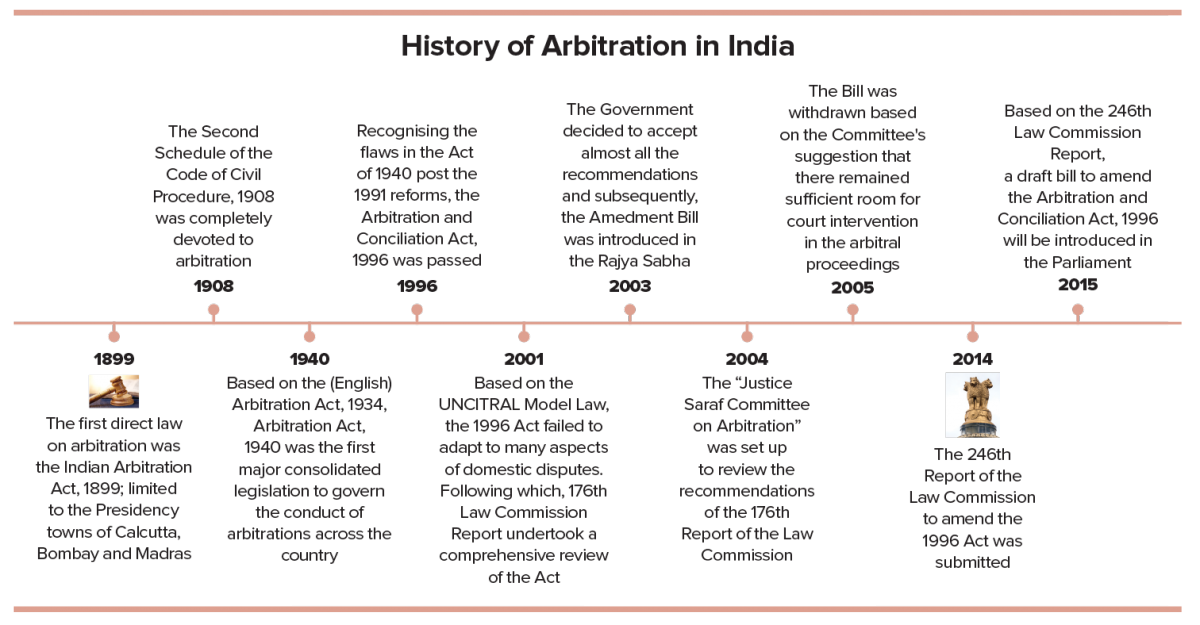Background of dispute resolution in India
According to National Judicial Data Grid (NJDG), India has pending cases of 3.3 crores. While 2.84 crores cases are pending in subordinate courts, the backlog clogging the High Courts and Supreme Courts is 43 lakhs and 57,987 cases respectively. Of all the pending cases, 60% are more than 2 years old, while 40% are more than 5 years old. In Supreme Court, 30% cases are more than 5 years old. On an average it takes 20 years for a real estate or land dispute to be resolved.
The dispute resolution has a great impact on Indian economy and global perception on “Doing business” in India. The above statistics clearly indicate the need of reforms not only speeding up the dispute resolution, but also having a strong in-country mechanism for out of the court dispute resolution.
Arbitration is a method by which parties to a dispute refers a person or more and agreed to be bound by Arbitration Award. The third party then examines the evidence in the case and imposes a decision that is legally binding on both sides and enforceable in the courts. Arbitration may be ad hoc or institutional.
The Arbitration and Conciliation Act 1996 is an Act that regulates domestic arbitration in India. The Arbitration and Conciliation (Amendment) Act, 2015 was notified on 1st January 2016 and is deemed to have come into force on 23rd October 2015. The (amendment) Act, 2015 has introduced a new provision of concluding the arbitration proceeding within a specified time limit by adding Section 29A.

Key Highlights of Arbitration and Conciliation (Amendment) Act 2015
- Provision of permitting the Arbitration institution to make their own rules consistent with the act to make the process smooth and effective
- Communication through electronic means to formulate arbitration agreement and standardize the fee of arbitrator and tribunal to control the exorbitant fee
- Amendment of fixing the time period as one year. It can be extended upto next 6 months with their agreement. Timely disposal by a period of 6 months will be incentivized by increasing the fees of the arbitral tribunal and delay is penalized up to 5% per month for each month of delay.
- Due to unreasonable adjournments, the arbitrator can raise the fee.
- The neutrality of the proceedings can be maintained through prescribing International Bar Association guidelines (Under fifth and seventh schedule) on conflict of interest of the act. Under this, the employee of the party to the dispute cannot be appointed as Arbitrator.

India as global hub of Arbitration
Ensuring legal reform is a key & critical priority to position India as key attraction of doing business. Complementing “Make in India” with “Resolve in India”, strong alternate dispute resolution mechanisms are important to ensure ease of doing business in India.
The Government of India took several initiatives to promote the importance of Arbitration and create the awarenes. NITI Aayog organized a successful two day conference “National Initiative towards strengthening Arbitration and Enforcement in India” in New Delhi in October 2016 with over 1600 participants which was presided over by President of India and Prime Minister of India and saw participation from the Chief Justices of all SAARC countries.
NITI Aayog also organized a two day National Law Day conference in 2017, with the Law commission of India which saw over 1400 participants on each day.
On 10-Oct 2018, the NITI Aayog and ICC International Court of Arbitration organized the inaugural Training cum Brainstorming Workshop on Best practices in International Arbitration in New Delhi. The workshop was a part of initiatives to institutionalize and streamline dispute resolution to make India a Hub for doing business. The workshop highlighted the understanding & implementation of Arbitration process across the commercial contracts, with over 200 senior officials from State & Central Governments and public sector undertakings participating.
The workshop covered the basic concepts of International Arbitration, included the best practices on arbitration processing, factors on deciding the venue, selection of arbitrators, enforcement of arbitration award and the role of courts before, during and after the arbitration. The topics of the information sharing session were delivered by world class faculty and practitioners from the United Kingdom, Singapore, Paris and India.
The training-cum-brainstorming workshop is an important part of the on-going endeavor by NITI Aayog in a co-operative setting to skill and prepare senior officers for global best practices and give them the opportunity to gain expertise in enhancing the ability to understand, review, revise and draft Arbitration related aspects of contracts.
Well written Tushar. Justice delivery system needs change and Arbitration is one of the best options.
LikeLike